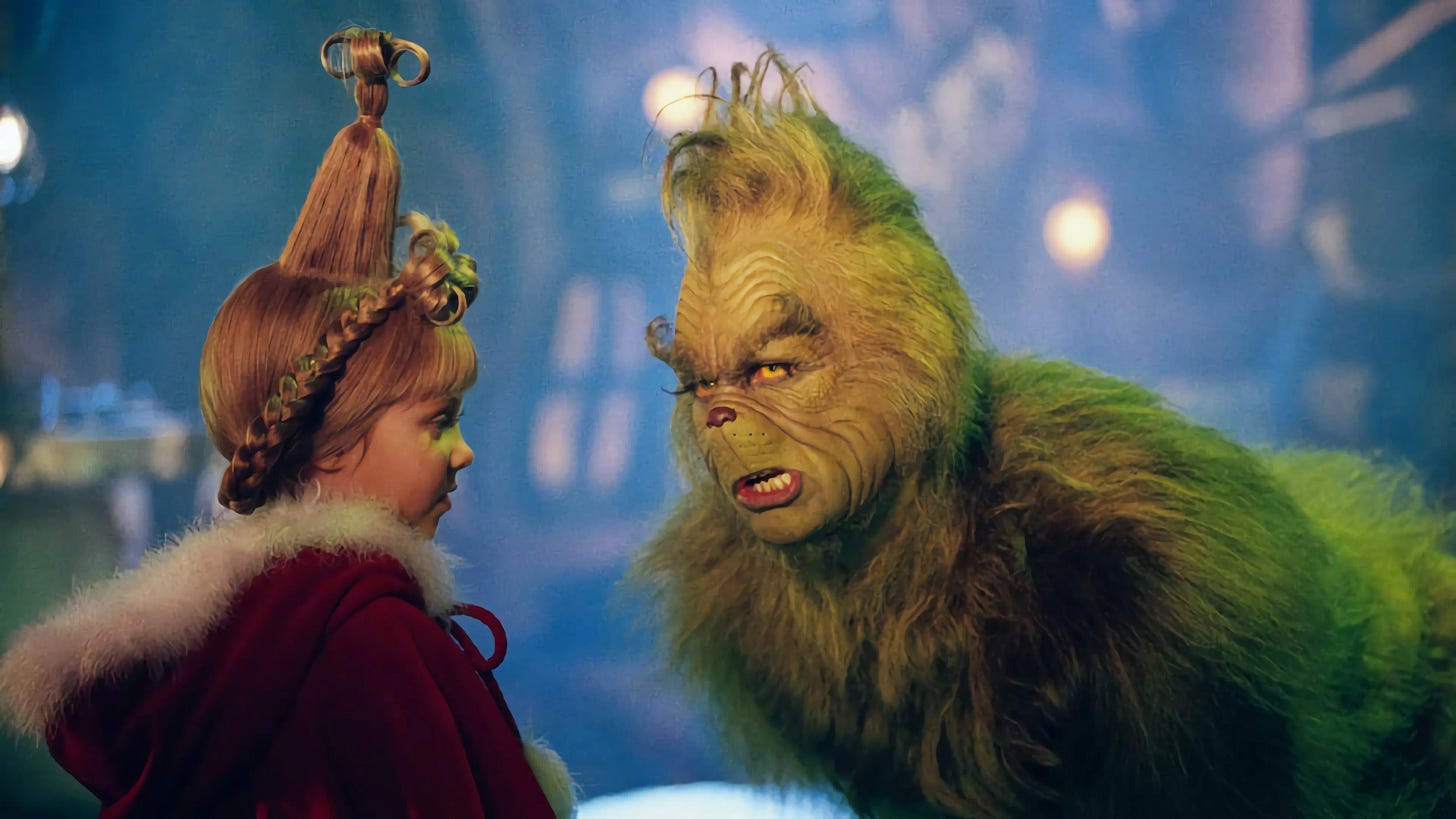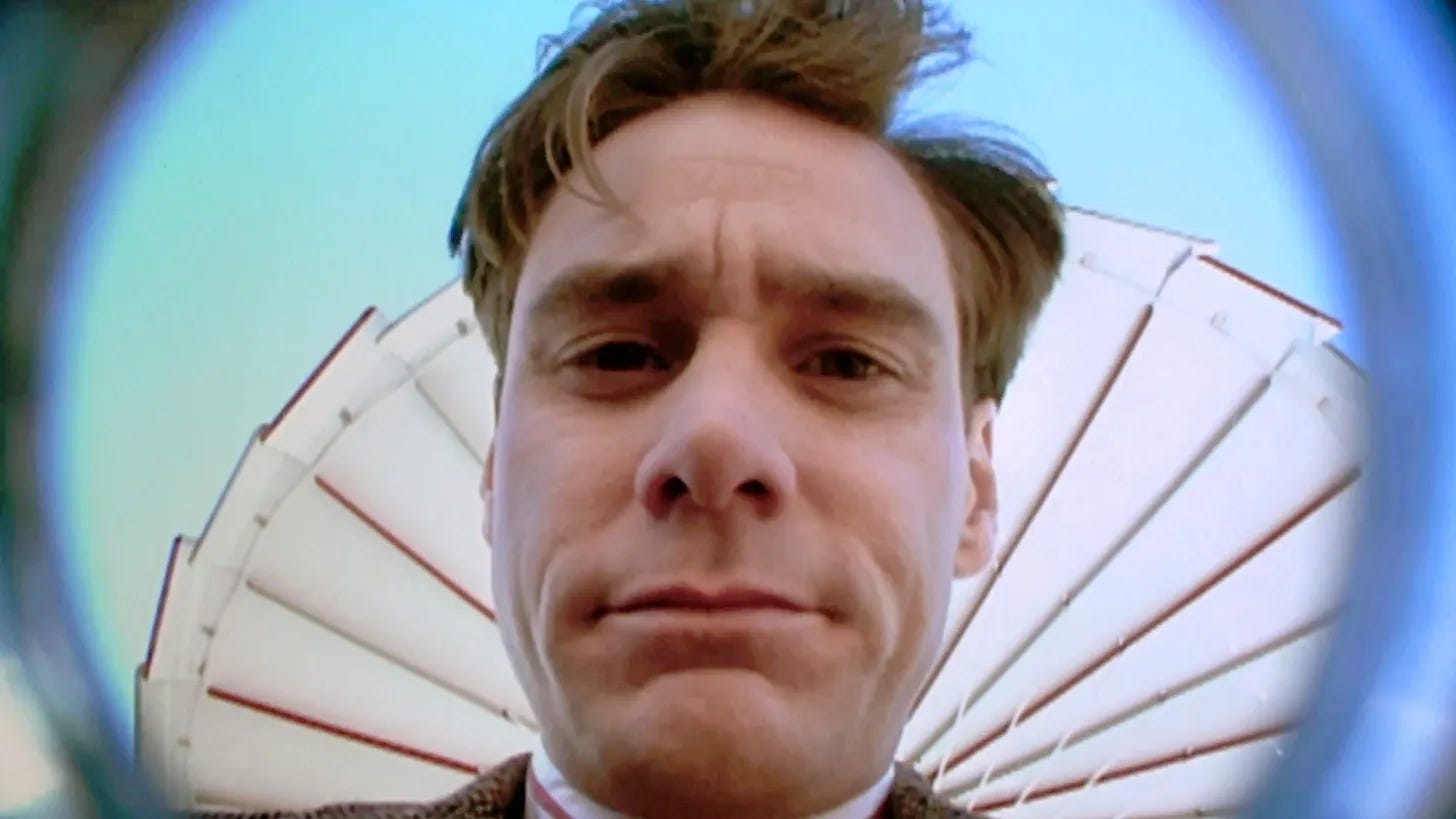Essay: It Is Important To Act Silly
Case in point: Jim Carrey's performance in 'Dr. Seuss' How The Grinch Stole Christmas'
When I first saw director Ron Howard’s extremely silly live-action turn-of-the-century adaptation of Dr. Seuss’s beloved holiday classic How The Grinch Stole Chrismas starring Jim Carrey, I was drunk and high. I rented the movie from my local Blockbuster video store with a pair of degenerate friends, one of whom I still remember.
The year was 2002, and the plan was to get fucked-up and watch a movie. I supplied the filthy fourth-floor walk-up in Queens, the TV, VCR, and rental. They supplied booze and weed and cocaine, and yes, it was a sad party. It was sad because I’m sober now, and my hindsight is crystal clear. It was also sad because we were all broke, and the coke was cut with caffeine, and the booze was the kind of cheap vodka you could disinfect surgical scalpels with.
Dr. Seuss' How The Grinch Stole Christmas was hopelessly ridiculous. We didn’t make it twenty minutes before deciding to watch my beat-up copy of Reservoir Dogs instead, a dependable one hour and forty minutes of snappy mayhem. I was in my late 20s, and Jim Carrey was corny. His brand of mass-market monkeyshine was also out of fashion, too. Downtown Manhattan was still an open wound; the country was at war, and I was unemployed.
In 2002, I was depressed, but I was also angry and scared, and when I laughed, I laughed at the misfortunes of those who I thought deserved misery. During those years, I learned to hate my political opponents. I learned to speak first, and think never. I didn’t deliver punchlines; I spat hot takes. I had opinions, monumental opinions, brilliant opinions based on emotions, and whatever I had just read on the internet. My judgments may have sounded sarcastic, but they were not. I was not joking.
Those years were grim. (They’re still grim.) I rejected Jim Carrey in 2002 because he was a frivolous movie star, you see. The future of the republic depended on men like me taking ourselves very, very, very seriously.
***
Dr. Seuss' How The Grinch Stole Christmas isn’t as bad as I remember. It’s loud and crass, sure. Cynical. The word “Hollywood” comes to mind. The production design wants to be whimsical and stylish, but the sets feel like an amusement park. The movie has one thing going for it: Jim Carrey, buried under pounds of green makeup, latex, and fur. His remarkable costume was so claustrophobic that the studio had to bring in an ex-CIA agent to teach him torture survival techniques.
Jim Carrey’s The Grinch is a crabby outcast with long eyelashes who lives for drama. He mugs and pouts and recites vainglorious monologues for his best and only friend, Max, the dog. Dr. Seuss' How The Grinch Stole Christmas had to turn a 26-minute cartoon into a nearly two-hour movie, so it gave the title character a backstory: Carrey’s The Grinch had his heartbroken as a weird kid, and he never got over it. He hates, double hates, and loathes, entirely, all the Whos who hurt him so long ago.
I don’t think the Grinch needed an origin, but I related.
The movie isn’t good, however. It's a lot like egg nog: thick and sickly sweet. Too much. It was also an early example of the entertainment industry's master plan to rehash beloved "intellectual properties."
And yet, I rented the movie anyway and rewatched it this weekend. The Grinch called out to me and not the more recent feature-length animated one featuring the voice of Benedict Cumberbatch as The Green One. So I searched through Amazon Prime and thought, “What the hell, it’s Christmas.” Four bucks well spent.
BUT. But. It’s entertaining, but only when Carrey is on-screen working hard for his immense salary. When the movie came out, in 2000, America was in great shape, the wealthiest and most powerful nation on Earth, a land of opportunity and happiness and endless bounty.
The movie cost $123 million to produce, $20 million of which went to Jim Carrey, one of the biggest stars of all time. By the year 2000, Carrey had proven his acting mettle in serious movies like the prescient dark sci-fi comedy The Truman Show, directed by Peter Weir, and the quirky and touching Andy Kaufman biopic The Man In The Moon, which Milos Forman directed. But he was rich and famous because of a string of unprecedented blockbuster comedies starting with 1995's Ace Ventura: When Nature Calls.
Carrey was a comedian who became a king by pretending he could talk out of his butt, a rubber-faced clown who made money acting very silly. And then, eventually, that came to an end.
Dr. Seuss' How The Grinch Stole Christmas was the summit of his career in some ways. The next few years would see him perform in what is likely his best movie, Michel Gondry’s Eternal Sunshine of the Spotless Mind, a mind-bending romantic tearjerker. But fewer and fewer of his comedies were connecting. It’s as if, once the ’90s ended, so did his hold on the collective imagination. He was the clown marshal of the very end of the 20th Century, and he was almost immediately rejected by a new century, a darker century, an era that would begin with death and war and inequality and, later, civil strife and plague.
That’s too bad. As I rewatched Dr. Seuss' How The Grinch Stole Christmas I became nostalgic for Carrey’s patented style of needy, hyperactive, over-the-top comedy. He is so desperate to please and gets totally lost in his unhinged buffoonery. His schtick isn’t witty. He’s not trying to critique society. Jim Carrey is just a silly man, and America has lost its sense of silliness.
I remember reading about some magazine editor declaring the end of irony a few days after the 9/11 terror attacks in New York City. He was a stylish and influential man who wasn’t rich but never wanted for the good things, and it makes me momentarily wistful for a time when anyone cared what a magazine editor thought. I sure didn’t at the time.
The weeks and months and years that followed 9/11 in New York were a blur, at least for me. I faintly recall the country happily marching to war, and the city doing its best to recover from an unthinkable trauma, but I’m not certain because I spent that time snorting and guzzling and generally departing reality as often and quickly as I could.
There were brief moments of sobriety when I was lucid enough to read and listen to smart people tell me America would become a more serious-minded and sincere nation. I think I internalized that a bit. Reports of irony’s death would continue for years after that editor delivered the bad news. It’s funny, in retrospect.
I don’t think irony was ever actually six feet under. The early 2000s produced all sorts of snarky hits like The Daily Show and Chapelle’s Show and the droll man-baby comedies of Will Ferrell, not to mention the internet itself, which at that time was one mass electronic eye-roll. I mean, it’s funny that the humorless editor of a big fancy magazine read by the beach house class would declare irony dead. He’s in charge of a newsletter now, I think.
It wasn’t just the editor who declared an end to laughter. Our pundits and politicians and other assorted poobahs used 9/11 to scare America straight-faced. We haven’t cracked a smile since then unless we’re baring our teeth.
***
America is a country desperately in need of silliness. Irony didn’t die post 9/11. Silliness did. Here’s how to be silly: don’t care what anyone thinks. Be fearless. Silliness is a kind of courage. It takes no spine to heckle, but standing up and waving your hand like a real ding-dong takes guts.
When one makes funny faces for a child one cannot be self-conscious. To earn the laughter of a toddler, one cannot have any dignity. There is no such thing as a genuinely funny face made by someone taking themselves seriously.
But I do think social media and our current political parties require a population of amateur content creators and citizen foot soldiers to feed their platforms and swell their ranks. They need people who take themselves so seriously they can’t see how tech executives and politicians are exploiting them. It is easy to flatter a serious person into submission. A person who is afraid of being laughed at is a person vulnerable to suggestions, and manipulation. A silly person, however, is neither vain nor scared. It’s hard to fool a fool because a fool is the first to admit when they make a mistake.
I make so many mistakes, big and small. I try to apologize when I hurt others. When I fail, I learn what I can and move on. And sometimes, I try to make mistakes on purpose, for fun. Why just the other day decided to answer my phone with a high-pitched voice I call “The Tiny Englishman.” My friend begged me to stop while he laughed. It was good to talk to him.
I recommend making a funny face. It is stress relieving. I made a funny face for my 10-year-old niece, who returned the favor. I crossed my eyes and smiled like a drunk frog—a specialty of mine—and for a brief moment, I was as light as a cheese doodle and lost in a moment of silliness. Later, back at my apartment, before my nightly shower, I made that silly face in the bathroom mirror and giggled.
I also recommend giggling more. There is so much cruelty and injustice in the world. Humans are animals granted many gifts. It is disappointing that we choose selfishness so often, especially when we are blessed with the ability to understand and sympathize with the pain of others.
A giggle is a firefly-sized joy—a tiny happiness, like bubbles. A giggle is a moment of innocence that connects us to a time long ago when wonder was easier to summon. I do not think giggles can defeat hate. Silliness won’t save the world from itself. But I promise you that performing a silly dance for a loved one will momentarily free you from the gravity of your own fucking ego. Pride goeth before a fall, but silliness goeth before a pratfall. A giggle is a good way to clear your heart for battle.
I dare you to act like a goof. Right now, make a fart noise with your mouth. Turn to a loved one and impersonate a chipmunk with buck teeth. It is impossible to send a self-righteous Tweet while wearing underwear on your head. A silly person is a person who does not judge. Silly people are self-aware. They laugh at themselves. The only true fool is someone who thinks they’re superior to anyone else.
The Grinch didn’t steal Christmas, as you know. He tried, but then his heart grew three sizes once he realized he was wrong about all the Whos in Whoville. I love Dr. Seuss’s story because he was a storyteller who believed in the power of ideas. The Grinch changes because he learns Christmas is an idea that can’t be stolen. Sometimes, I wish the Grinch would steal the Fourth Of July so Americans would be forced to celebrate the ideals this country was founded upon. We’d salute a flag that’s not there and hold hands in a circle and recite the preamble of the Declaration of Independence. Who needs beer and hot dogs because we have the Bill of Rights?
I don’t think Jim Carrey’s Dr. Seuss' How The Grinch Stole Christmas is as memorable as the original animated network version that premiered in 1966, featuring the voice of Frankenstein himself, Boris Karloff. But I’m glad I decided to give it another chance because Jim Carrey put his heart into the role. He is a living cartoon, a sentient noodle, but, more to the point, he is a deeply silly, fully-grown adult. I had no idea how important that is until now. We should all practice pretending to talk out of our butts.
New 150 Word Review: 'Emilia Pérez' (2024)
‘Tis the season to support local bookstores!
My critically-acclaimed funny/sad memoir Theatre Kids is the perfect holiday gift for recovering thespians with bad attitudes.










This is great, I enjoyed this. Jim Carrey is a fascinating human being and I love how you profile him. To me, the Jim Carrey story has met it’s natural third act as he essentially becomes a buddhist monk.